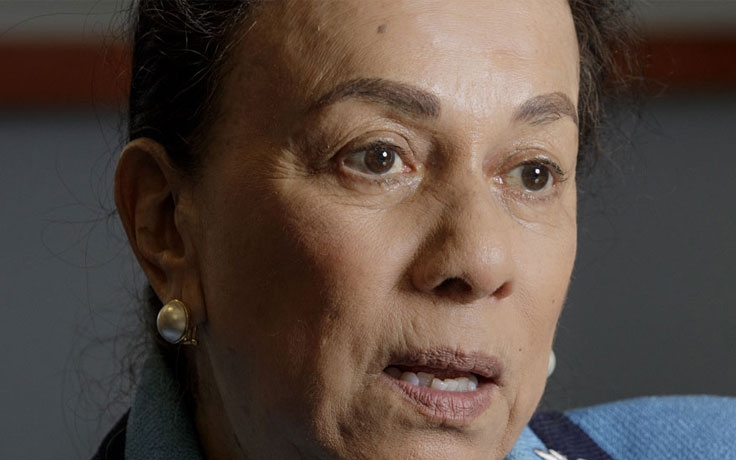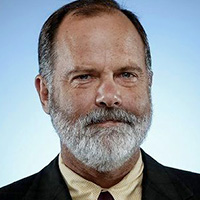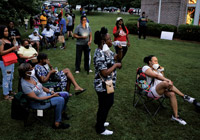The work of philanthropy begins with need — locating and appreciating people who are desperate. And once those in need have been found, the business of helping them requires more than generosity. It demands strategic vision, tactical sophistication and guts.
It is a business that combines practical skills and a devotion to community.
Sadly, Los Angeles has no shortage of need, as any trip across town, with its multiplying tent cities, testifies. But fortunately for this region, it also has the California Community Foundation and its leader, Antonia Hernandez, who is as shrewd and tactical as she is generous.
“We’re venture capitalists,” Hernandez said in an interview this summer, sitting at a conference table in the foundation’s downtown offices, half-empty to protect employees from COVID. “It’s not just to pass through the money. Our goal is to change the way government contracts with nonprofits.”
The foundation accepts bequests and donations to its various funds — from disaster relief to scholarships to community improvement — and uses the money to support groups that perform this work. It gives not to individuals but to nonprofits and community organizations. It does not accept federal grants because of the entanglements they often create.
Since 2000, the Community Foundation has given away more than $200 million, and in 2015, Hernandez and the foundation pledged an additional $1 billion to the people of Los Angeles County through the organizations it assists. The foundation is not only a mainstay of philanthropy in Southern California; it is also a formidable force in politics and government, supplementing the efforts of the sometimes-divided city and county and aiding those trying to solve problems that have tumbled through wide holes in the area’s safety net.
From a communal ranch to MALDEF
HERNANDEZ WAS BORN IN 1948 on a communal ranch in Torreón, Mexico. Cattle were owned collectively, as was the land. She grew up in an atmosphere of mutualism and common responsibility, ideas that have shaped her ever since.
When she was 8 years old, Hernandez moved to East Los Angeles with her mother and father and, eventually, six siblings. She arrived knowing no English. She bluffed her way through the language before learning enough to handle herself at school and in the fields of the Central Valley, where she picked vegetables and fruit. She wore long sleeves on broiling days to keep off the peach fuzz. To this day, one of her sisters cannot bear the taste of peaches.
When picking season ended and the school year began, her family would return to Los Angeles. Hernandez did well at Garfield High School, then entered community college. A teacher encouraged her to transfer to UCLA, where she completed her undergraduate degree in 1970, then graduated from UCLA Law School in 1974. She passed the bar and became an American citizen, so overcome with emotion to be taking the oath that she had a “knot in my throat.”
Hernandez went to work at the Los Angeles Center for Law and Justice. She focused on civil rights and worked in the late 1970s for Sen. Edward M. Kennedy as a staff lawyer at the Senate Judiciary Committee; Hernandez was the first Latina to serve as counsel to the Committee. In 1980, she moved to Kennedy’s presidential bid. When he lost to Jimmy Carter, she joined the Mexican-American Legal Defense Fund.
MALDEF’s broad goal was to defend Mexican Americans. More specifically, it targeted immigration and political representation, including voting rights — all as vital in the 1980s and 1990s as they are today. Hernandez supervised litigation and advocacy, and her work inevitably drew her into politics. She was a forceful voice against Prop. 187, the notorious 1994 ballot initiative that sought to deny state services — including medical care and education — to undocumented immigrants.
The measure passed, but most of its provisions were later declared unconstitutional, just as Hernandez and others had warned. In the process, the battle against Prop. 187 invigorated Latino/a voters and helped usher in the decline of the Republican Party in California.
Reflecting on Prop. 187 in 2016, amid President Donald Trump’s frequent denunciations of immigrants, Hernandez co-authored an Op-ed piece with Alex Padilla, then the California secretary of state. “We know that the discriminatory nativist rhetoric we’re hearing now is not new,” they wrote. “But because we have experienced it before, we know how to overcome it.”
Padilla is now a United States senator.
COVID-19 and inequality
IN 2004, HERNANDEZ BECAME THE DIRECTOR of the California Community Foundation, then approaching its 100th anniversary of service to Los Angeles. From that vantage point, she has a clear view of the most desperate problems facing the area — and of the fissures in the region’s network for solving those problems.
COVID-19 has widened some of those fissures and exposed others. Take, for instance, Internet connectivity. Access to the Internet was a concern before COVID. Poor communities struggled to connect to services more easily reached in areas where Wi-Fi connections were faster and easier to use. With COVID, however, what once seemed a luxury now became essential: Faster connections not only enabled video games to run more quickly, but now they also were access points to life. To be without a connection was to lose opportunities to work, to go to school, to reach a doctor.
“COVID amplified the needs of the poor,” Hernandez said. “People don’t understand that if you’re earning $25,000 and Spectrum or T-Mobile is charging you over $100 a month, you can’t afford it. So that’s an issue that we’re now really focused on. It’s a little ambitious, but we’re committed to creating a public connectivity fiber system.”
The foundation also is creating a nonprofit infrastructure that specializes in the digital divide. Its role will be to advocate and press for further improvements.
Why, one might ask, should the California Community Foundation be responsible for creating Internet access? Or, for that matter, for helping the homeless, or educating young people? Those sound like they should be responsibilities of government, the stuff taxes pay for.
The reason is that government has come up short. The Los Angeles Unified School District, hampered by weak superintendents and fractious board politics, is a long-standing source of frustration, as are the Los Angeles City Council and the County Board of Supervisors, both of which often see needs as district-level challenges rather than problems requiring large, regional solutions. Term limits also impede big thinking, pushing elected officials to concentrate short-term when many troubles require sustained attention across decades. As a result, the city and county wrestle with each other in areas such as homelessness and transportation, making progress but often slowly and in frustrating contrast to the region’s mounting headaches.
Hernandez agrees that the foundation’s work places it in areas that government might claim, but she argues that the demand is big enough for both. Coordination is necessary between the public and private sectors, she says, and the foundation sometimes brokers their roles. “Government is a regulator,” she said. “They’re not your friendly, consumer-oriented [organization]. … We’re becoming the bridge between government and the community.”
To serve as a bridge, the foundation has experimented. For instance, government often pays nonprofits only upon completion of a contract. That makes sense from an oversight perspective. It helps ensure that taxpayers don’t fund services that are not delivered. But many nonprofits are on such shoestring budgets that they cannot afford to wait for payment. The foundation has responded by creating bridge loans that allow nonprofits to borrow money and then repay it when contracts are fulfilled.
Global needs, local responses
HERNANDEZ SEES NEEDS AS BOTH LOCAL (the consequences of young Black men coming up short of diplomas in many L.A. high schools) and global (health care should no longer be seen as something to be purchased but rather as a fundamental human right). She dismisses windbags and praises those whose work is changing lives. She is tough-minded and easygoing, as comfortable mingling at the Hollywood Bowl as she is questioning a destitute woman about what her children need to survive.
As she views Los Angeles, Hernandez worries about gaps in leadership, about the uncertainty of its direction and about a lack of urgency that so many officials seem to have regarding its challenges.
But she remains committed to this city and region, unsure of itself as always but also brimming with promise.
“Am I optimistic?” she asked. “In a way, sort of.”
She sees potential among possible candidates to succeed Mayor Eric Garcetti, recently named to become the next U.S. ambassador to India. She is hopeful that the cries of the homeless and the pleadings of the uninsured will reach those in power. She rejects defunding the police but sympathizes with those who experience police abuse.
She worries, however, about whether L.A. institutions are capable of responding to long-standing demands that COVID-19 has made suddenly more present. Indeed, COVID has framed even more basic questions: Where does an individual’s right to refuse a vaccine, for instance, impinge upon a community’s right to live in health and safety?
“I come from a communal life,” she said. Americans tend to think in terms of individual rights, she added, but in other cultures, including many of those that supply Los Angeles with its diverse pool of immigrants, community values are at least as important as individual freedoms. “That’s what we do in a family. We have to think about the common good and where we fit into the common good. And I think that’s something this pandemic has shown us: the yearning for human connection, the family structure.”
These issues are being tested on the ground every day, and Hernandez believes that how they are addressed will determine the future of the home she came to as a third grader.
“California is the laboratory of the future, and L.A. is ground zero,” she said. “We’ve come to accept the messiness of life here … the liberties, the opportunities. And I think we’re melding the good of what this country has to offer with the communal sense. That’s where liberal democracy will succeed.”

























